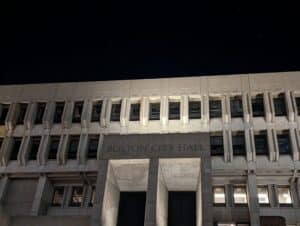If Boston is going to be able to meet the challenges of the moment, its body overseeing development needs a new charter, Boston Planning & Development Agency officials argued to city councilors Monday.
But the discussion of Mayor Michelle Wu’s latest home rule petition at a three-hour meeting of the City Council’s Committee on Government Operations revealed some councilors still have reservations and a pile of questions about Wu’s larger vision for the BPDA more than a year into her tenure.
Wu had asked councilors to approve a series of administrative and legal changes that would see the entities legally known as the Boston Redevelopment Authority and the city’s Economic Development and Industrial Corp. formally merge into a single, new entity to be known as the “Boston Planning & Development Agency” – the name under which both quasi-governmental organizations have been jointly operating, controlled by the same board, since 2015. As part of that reorganization, the new entity will assume all leases, obligations, land disposition agreements, employment agreements and other contracts the Boston Redevelopment Authority and the EDIC are currently party to.
Councilors are also being asked to end the BPDA’s urban renewal plans and change the basis on which it is allowed to acquire property or grant property tax agreements, known as 121a deals, for redevelopment projects. Instead of having to justify its moves as attacking “blight,” “decadence,” “sub-standard housing” or “urban decay” under generations-old legislation, the BPDA would move to focus its justifications on climate resiliency, equity and affordable housing.
“This is first and foremost about urban renewal and the future of urban renewal in our city. Sunsetting that era in Boston’s history but doing so in a way that protects important community items of value that urban renewal currently protects and allow us to transfer some of the real estate tools we might like to use in the future to affordability, equity and resilience,” said BPDA Deputy Director Devin Quirk. “It doesn’t move staff to the city, it doesn’t change the development process. We’ll still have a BPDA board. That board will still approve development projects through the Article 80 process.”
The changes will also help the agency respond to the city’s 21st century concerns, officials said. Currently, for example, the BPDA doesn’t have the ability to buy land for affordable housing or the construction of flood defenses, Quirk said.
“In the past, you might have tried to jam a definition of a problem into ‘blight’ or ‘decadence’ or ‘sub-standard housing,’ now, if you’re doing something about climate change like an innovative energy system or doing more affordability than is required, things like that, you’ll be able to get tax relief,” BPDA Director Arthur Jemison said.
The Wu administration plans to propose deeper structural changes to the development-approvals process next year, Jemison said, like consolidating the quasi-public agency’s current planning staff in a new “Department of Planning” directly under mayoral control and establishing an appointed Boston Planning Board similar to those in use by other cities around the state to replace the BPDA board’s current role in development approvals. But the current measure councilors are considering doesn’t move any of those plans forward, Jemison and Quirk said.
Still, many of the 12 city councilors in attendance Monday, out of 13 on the entire council, indicated they felt confused by the measure and how it related to Wu’s future plans, raising concerns about a range of topics like the new agency’s finances, its powers and the future of the BPDA’s current workers and their benefits.
“We’re changing the entire way we do business and we should know all the details,” Dorchester Councilor Frank Baker declared. “I just don’t think we’re ready for a vote.”
In response to pushback from Baker and several other councilors at the idea of voting on the proposal this week, Government Affairs Committee Chair Ricardo Arroyo scheduled a working session for Friday to discuss the matter further. If the City Council approves the measure, the petition must then be approved by the state legislature.




 |
| 


